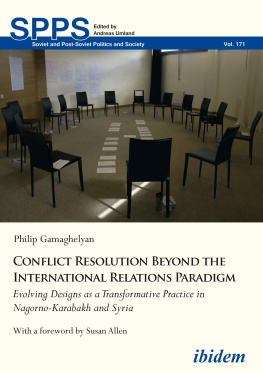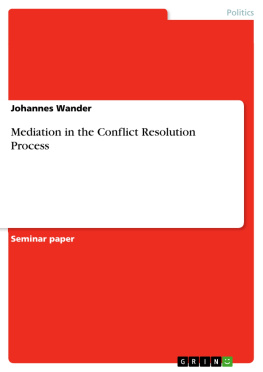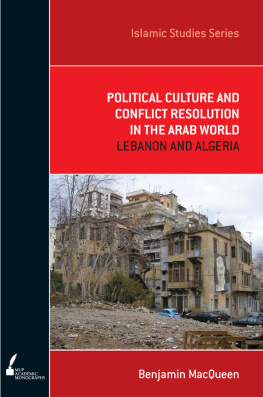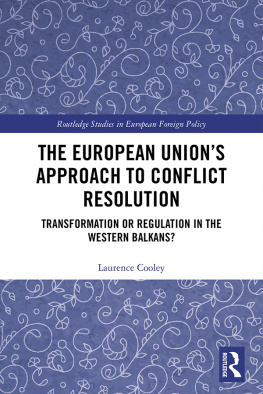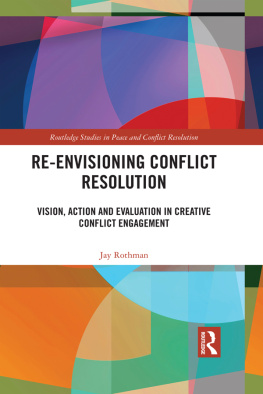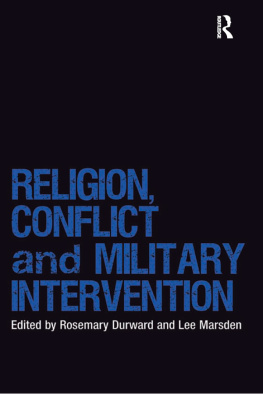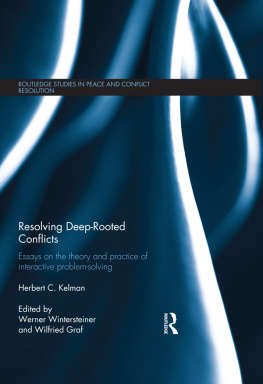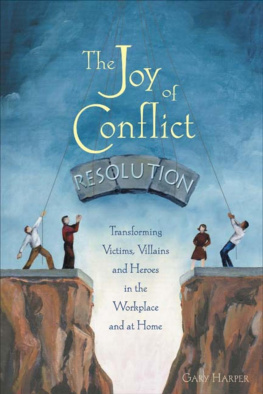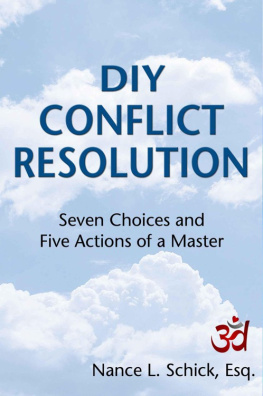Acknowledgments
It is hard to find words to describe the depth of gratitude I feel to my family, friends, colleagues, and mentors for years of unwavering support that allowed me to complete this book that developed out of my dissertation.
First and foremost, I am grateful to my mentor, colleague, and dissertation committee chair Dr. Susan Allen for her advice, challenge, ongoing communication, feedback, and suggestions on numerous drafts of each chapter. I am particularly grateful to Susan for encouraging me to develop my own voice in the field and to stay true to my constructivist belief system, for her support to my choice of a not-very-traditional to conflict resolution action research methodology that proved to be invaluable and innovative both for the findings in this book and the practices that it touched.
I am thankful to my dissertation committee member Dr. Susan Hirsch for her amazing deconstructive and reconstructive touch that helped me to rethink the entire organization and structure of this book. I am grateful to Susan for her support in helping me develop the ethnographic angle of my research. And I am grateful to her for my times as a Graduate Teaching Assistant in the School for Conflict Analysis and Resolution (S-CAR) undergraduate program, where thanks to Susans collegial approach, I felt a valued and integral part of the team working on innovation of curricula and teaching methods.
I am fascinated and feel extremely lucky to have worked with my dissertation committee member Dr. Jessica Srikantia, who effortlessly combined in her approach utmost care, emotional and intellectual support for my work, with an equally blunt challenge to the patriarchy, racism, classism, and many other isms subconsciously held by me and present in my writing. A great many of Jessicas comments made me pause my work, re-engage in reading, reflection, and self-questioning, very often leading to cardinal changes in my approaches to this book, practice, and life in general.
I am grateful to the School of Conflict Analysis and Resolution of George Mason University (GMU) for serving as my academic home during my PhD studies, and for the Dissertation Completion Grant that allowed me to concentrate on writing in the most intense stage of the research.
I am forever indebted to my close friend and colleague from the Imagine Center for Conflict Transformation (Imagine Center), linguist, Maria Karapetyan, who fully deserves to be named the chief editor of this book. From the very first line of the proposal to the very last line of this book, Maria has been the person with whom I discussed every section of every draft of this book; she was the first reader, the main critic, and the adviser. No time did Maria show that this work has been a burden for her, though it took weeks if not months of her time. I cannot imagine finishing the book without Marias friendship and support.
I am very lucky to be surrounded in my work by a great team of friends and colleagues who are always supportive, always challenging, extremely smart and courageous, devoted to each other and the vision of peace. In addition to Maria Karapetyan, our team of current and former colleagues who supported me in writing this book includes Sona Dilanyan, Veronika Aghajanyan, Sergey Rumyansev, Pinar Sayan, Christopher Littlefield, Arzu Geybullayeva, Hamida Giyasbaily, Sevil Huseynova, and Zamira Abbasova. I want to thank them for their dedication, support, and the time spent reflecting, hearing, questioning, and advising. Most importantly, I am appreciative for their openness in allowing us to experiment in our practice with the insights gained through the action research process of my research. Without such support from the team, it would have been impossible to complete the action part of the reflection and action cycles of the research that resulted in this book. A particularly strong thank you goes to Sona Dilanyan on whose judgment and advice I relied when working through particularly sensitive passages.
I am grateful to my fellow students, Jacquelyn Greiff and Matthew Graville, in the Reflective Practice class at S-CAR, GMU, for all the time they devoted to reflection sessions that would support the research that resulted in this book. During the year-long period of our joint work on some of the Imagine Centers projects, Jacquelyns perspicacity through all our reflective conversations in her office and on our flights to and from the project locations shaped many of the core ideas of this book.
I thank all the colleagues working in the Nagorno-Karabakh and Syrian conflict contexts who participated in this research and particularly its reflection and action part, yet who I cannot name in the interest of preserving their anonymity. The insights, findings, and innovations suggested here belong to them as much as they belong to me.
And I am most appreciative of the opportunity to express how incredibly lucky I am to have near me Zara Papyanmy best friend, my life partner, and my spouseand my two boys Mark and Mikael, who tolerated me despite my continuous evening disappearances in the bedroom with books, papers, and laptops. I am deeply touched by the care, not least in form of an ongoing supply of tea and fruit, that kept me going through hours of writing, and for all the love expressed through undeserved hugs and cheers as I would emerge from my cave. I love you!

